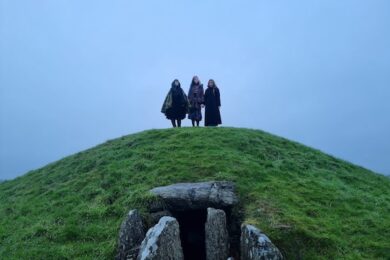In the late 90s and early 00s, the Polish music business deluded itself into thinking that singing in English would bring mainstream music closer to the West. The same happened in many Central and Eastern European countries that wanted to break through to the British or American market. It quickly became apparent that singing in English changed nothing, and non-English lyrics could be even more interesting, adding value to the music. If one looks from today’s perspective at the most exciting phenomena of that period, the things that captured the imagination of the West were extraordinary artists such as Svitlana Nianio, Księżyc, or Havlovi: homegrown, original, outsiders in their way, whose idea was not “to play internationally” but to “play on their own”. That gets the audience’s attention.
The last few years have seen this topic return. But maybe it’s when we pay more attention to what is not English singing, that we find interest in it. Artists worldwide pay homage to the uniqueness of local languages or regional dialects, sometimes explicitly looking for ways to resurrect forgotten ones. Ernest Bergez, as Sourdure, sings Occitan, which he decided to learn after living in the Massif Central. Marion Cousin reaches for Iberian, Mallorcan, and Menorcan oral culture. She recently sang songs in the Portuguese dialect Mirandese. Tarta Relena draws on texts from various parts of the Mediterranean Sea. And the Meridian Brothers are tireless in their storytelling, derived from the cumbia and plasticity of the Spanish language. These are just a few examples.
Eblis Alvarez, founder of the latter group, told me a few years ago that the best way to communicate in times of global invasion is to “keep the local and make it global – instead of taking global things and making them local”. Language is one of the tools that can help you do this. The key is not formatting your message so that the lyrics are directly readable but to make the musical form combined with the sound of the language interesting enough to make people want to get into it despite language barriers.
On my way to All Tomorrow’s Parties Festival 2016 in Prestatyn, I remember looking at Welsh names on the train platforms as if they were from Tolkien tales. It fascinated me, but I couldn’t read it and didn’t even try because it would break my tongue. But when I first heard Tristwch Y Fenywod (featuring the members of Guttersnipe, Hawthonn, and Slaylor Moon) crossing language and aesthetic barriers, I dived into their music immediately. On the one hand, they sing exclusively in Welsh, but they leave the oral and instrumental tradition behind and do not play a piece of folk music. It sounds ancient sometimes but is modern; the point is not studio-advanced production but its simplicity. Its sticking point is language – it makes the story come alive.
The group forge a combination of primitivism, musical minimalism, and hypnotic trance. The music takes on a slight tantric, slightly disco flavour. Apart from the band’s lyrics in Welsh, what’s new is that musicians are switching to instruments they mostly didn’t play before. Leila Lygad, a vocalist before, plays drums. Gwretsien Ferch Lisbeth created an instrument consisting of two Russian zithers with a contact mic in the middle, each tuned differently. Only Sidni Sarffwraig plays on her usual instrument, the bass, but it’s reduced to a minimum here. No deep, boomy sound, but rather sharp and minimalistic pulls. The music sounds metallic and dry, with no manufactured depth. Just the simplicity of a roadside troupe playing their songs, which should only be taken as a compliment.
Their new instrument is also the Welsh language itself: they take a unique timbre, an arrangement of words with extraordinary lyrical potential. In doing so, they sound thoroughly contemporary. It doesn’t mean that their songs don’t have lyrics – their name means “sadness of women,” and you can feel it in the album’s mood. You can also find it in the lyrics. The slightly upbeat and trancey fairytale-noir ‘Blodyn Gwyrd’ reminds me of HTRK’s first recordings. The deathly ‘Gelian Gors’ reverberates with afterimages of Suicide. The fatalistic ‘Ferch Gyda’r Llygaid Du’ has a bit of the spirit of the Cocteau Twins, whereas ‘Y Trawsnewidiad’ is about the other side, drawing attention to the lyricism and esotericism of Svitlana Nianio. Tinged with reverb, a procession of two zithers come to the fore.
Tristwch Y Fenywod’s debut album is mysterious and intriguing, with gothic atmospherics intersecting rumbling repetition, sometimes kept in a steady, obscure, slightly disco mood. The somewhat magical lyrics combine social aspects, feelings of loneliness, relationships, or elements of magic in everyday life are hidden behind this esoteric music. It sums up a surreal contemporary fable about despair and the inevitable end. Accompanied by a steady trance, sacred-sounding strings, and a slightly funereal-sounding bass, they weave a magical tale set in a fantasy land in which language makes this musical story unique.



